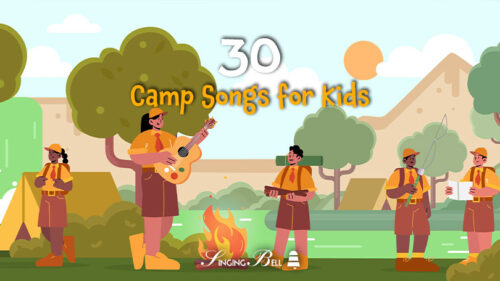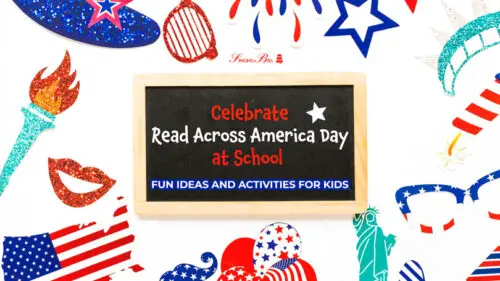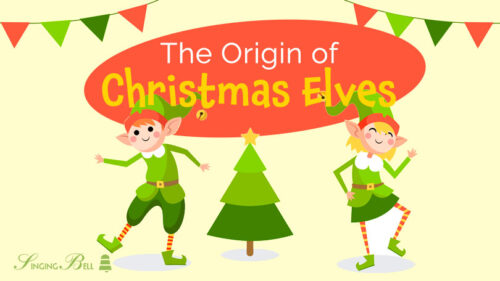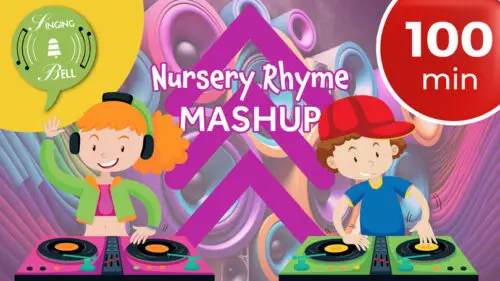These rounds for kids offer a fun and educational way to explore harmony, rhythm, and the joy of singing together.

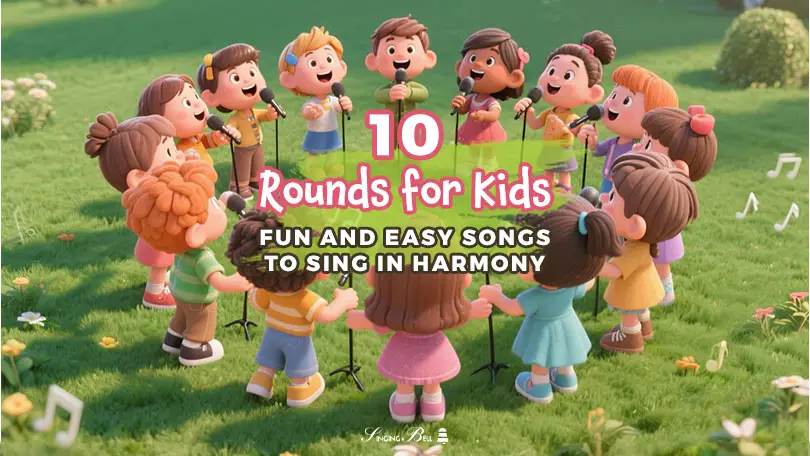
Singing rounds is one of the most enjoyable ways for children to explore harmony, rhythm, and teamwork through music.
Rounds are songs that can be sung by two or more groups starting at different times, creating a beautiful overlapping effect. They’re simple to learn, fun to perform, and perfect for teaching musical awareness, listening skills, and cooperation. Many traditional rounds come from folk songs passed down through generations, while others are modern compositions that bring new life to this timeless form of singing.
Whether in the classroom, at camp, or during family singalongs, rounds are an easy and delightful way to make music together.
Table of Contents
- Rounds vs. Canons – What’s the Difference?
- How to Teach Rounds
- 10 Easy Rounds for Kids to Sing in Harmony
Rounds vs. Canons – What’s the Difference?
The terms round and canon are often used interchangeably, but they have slightly different meanings.
- A round is a type of canon where everyone sings exactly the same melody starting at different times — like “Row, Row, Row Your Boat.”
- A canon, on the other hand, is a broader musical form where the parts might not be identical but still fit together harmoniously when sung in sequence.
In other words, all rounds are canons, but not all canons are rounds.
How to Teach Rounds
When teaching a round (or canon), it’s best to approach it in a natural and playful way rather than with too much explanation.
Begin by letting the children sing the song together in unison until they feel confident and comfortable with the melody. Then, without announcing what’s coming next, turn your back to them and quietly begin singing the same song again from the beginning. Some children will instinctively continue their own part while others may join you, creating a spontaneous two-part harmony.

This simple experiment introduces the magic of singing in rounds in a way that feels organic and fun. Once they’ve experienced how the voices overlap, you can pause and explain what just happened — that they were singing a round (or canon), where the same melody is sung at different times.
Depending on the age and level of your group, you can then assign groups or sections to start at different points and build toward a complete multi-voice round.
10 Easy Rounds for Kids to Sing in Harmony

Row, Row, Row Your Boat
One of the most iconic children’s songs of all time, Row, Row, Row Your Boat is a simple yet brilliant example of a round.
Each group begins the same melody one phrase apart, creating a rippling effect that sounds like water — perfectly matching the imagery of rowing down a stream. Its repetitive melody makes it ideal for beginners learning to sing in parts.

Row, row, row your boat,
Gently down the stream.
Merrily, merrily, merrily, merrily,
Life is but a dream.
Frère Jacques
This traditional French nursery rhyme is probably the most famous round in the world. The melody is easy to remember, and when sung in overlapping parts, it creates a rich echo that’s both fun and satisfying.
Its repetitive lyrics about a sleepy monk make it charming for children while teaching timing and pronunciation. It is often sung in French or English.

French Lyrics
Frère Jacques, frère Jacques,
Dormez-vous? Dormez-vous?
Sonnez les matines! Sonnez les matines!
Ding, dang, dong. Ding, dang, dong.
English lyrics
Are you sleeping, are you sleeping,
Brother John? Brother John?
Morning bells are ringing! Morning bells are ringing!
Ding, dang, dong. Ding, dang, dong.
Three Blind Mice
A beloved English nursery rhyme, Three Blind Mice can also be sung as a simple round.
The short, catchy tune allows each group to join in easily, and the overlapping lines help young singers practice coordination and listening. It’s a playful way to build early ensemble skills.

Three blind mice, three blind mice
See how they run, see how they run.
They all ran after the farmer’s wife
Who cut off their tails with a carving knife
Did you ever see such a sight in your life
As three blind mice
Mango Kiwi Banana (The Fruit Canon)
A modern, kid-friendly round, Mango Kiwi Banana brings a fruity twist to traditional singing games. With its catchy rhythm and cheerful lyrics about tropical fruits, it’s perfect for classrooms or music workshops.
When sung as a round, each group enters in turn, creating a lively, rhythmic layering that feels like a musical fruit salad.

1.
Mango, mango, mango, mango
Mango, mango, mango
Mango, mango, mango, mango
Mango, mango, mango
2.
Kiwi, kiwi, kiwi, kiwi, kiwi, kiwi
Kiwi, kiwi, kiwi, kiwi, kiwi, kiwi
Kiwi, kiwi, kiwi, kiwi, kiwi, kiwi
Kiwi, kiwi, kiwi, kiwi, kiwi, kiwi
3.
Anana, banana, anana
Anana, banana, anana
Kookaburra
Originating from Australia, Kookaburra celebrates the laughter of the famous kookaburra bird. Its joyful tune and nature-inspired lyrics make it a favorite among children everywhere.
Sung as a round, each group’s entrance imitates the echoing call of birds in the forest, giving the song its distinctive charm.

Kookaburra sits on the old gum tree,
Merry merry king of the bush is he.
Laugh, Kookaburra, laugh, Kookaburra,
Gay your life must be!
Kookaburra sits on the old gum tree,
Eating all the gum drops he can see.
Stop, Kookaburra, stop
Kookaburra Save some there for me!
Kookaburra sits on the old gum tree,
Counting all the monkeys he can see.
Laugh Kookaburra, laugh Kookaburra
That’s not a monkey, that’s me!
Hey, Ho, Nobody Home
This English round has a hauntingly beautiful melody, often sung in two or three parts. Despite its simple words, the overlapping voices create a full, rich harmony that feels surprisingly complex.
It’s perfect for introducing kids to minor tonality and expressive group singing.

Hey, ho, nobody home
Meat nor drink nor money I have none.
Yet will I be merry, very merry
Ah, Poor Bird
A gentle and lyrical English round, Ah, Poor Bird carries a tone of quiet reflection. The smooth, flowing melody overlaps gracefully when sung in a round, teaching children about phrasing and musical expression. Its serene character makes it a lovely choice for calm group singing moments.

1. Ah poor bird,
Take your flight,
Up above the sorrow
of this dark night.
2. Ah poor bird,
As you fly,
Can you see the dawn
of tomorrow’s sky?
Banuwa
Banuwa is a traditional Liberian song that’s often taught as a round in classrooms worldwide. Its repetitive phrases and flowing melody make it easy for children to learn and sing in harmony. The staggered entries give it a soothing, wave-like sound typical of African folk-style rounds.

Banuwa, Banuwa, Banuwa yo
Banuwa, Banuwa, Banuwa yo
A la no, nehnio la no, nehnia la no
Banuwa, Banuwa, Banuwa yo
I Love the Mountains
This American folk favorite combines outdoor imagery with joyful repetition. Its simple melody and upbeat rhythm make it a natural for multi-part singing.
Sung as a round, it builds a warm, echoing chorus that captures the feeling of singing together around a campfire.

Boom-dee-a-da Boom-dee-a-da
Boom-de-a-da Boom-de-yay
Boom-dee-a-da Boom-dee-a-da
Boom-de-a-da Boom-de-yay
I love the mountains.
I love the rolling hills.
I love the flowers.
I love the daffodils.
I love the fireside.
When the lights are low…
Boom-dee-a-da Boom-dee-a-da
Boom-de-a-da Boom-de-yay
Boom-dee-a-da Boom-dee-a-da
Boom-de-a-da Boom-de-yay
I love the mountains.
I love the rolling hills.
I love the flowers.
I love the daffodils.
I love the fireside.
When the lights are low…
Boom-dee-a-da Boom-dee-a-da
Boom-de-a-da Boom-de-yay
Boom-dee-a-da Boom-dee-a-da
Boom-de-a-da Boom-de-yay
Boom boom boom!
A Ram Sam Sam
A Moroccan children’s song full of energy and fun, A Ram Sam Sam is both a song and an action game. When sung as a round, each group starts at a different time, turning the rhythmic chanting into a playful, syncopated experience. It’s a great way to combine singing, movement, and rhythm practice.

1. A ram sam sam, a ram sam sam
Guli guli guli guli guli ram sam sam
A ram sam sam, a ram sam sam
Guli guli guli guli guli ram sam sam
2. A rafiq, a rafiq
Guli guli guli guli guli ram sam sam
A rafiq, a rafiq
Guli guli guli guli guli ram sam sam
You can replace the 2nd verse with this greeting version:
Hello (name), hello (name)
Guli guli guli guli guli ram sam sam
Hello (name), hello (name)
Guli guli guli guli guli ram sam sam
Alphabetical list of All rounds for children
Liked it? Pin it!
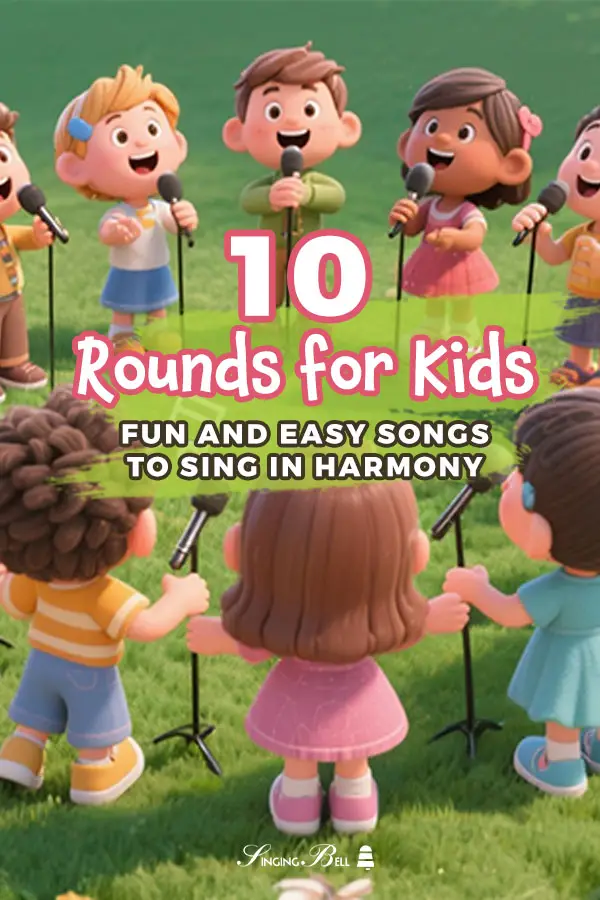
Did you like this post? Rate it!
You may also like:
Best Spotify Playlists for Kids
10 Historical Songs for Kids: Folk, Protest, and Patriotic Tunes


